Exploring Kenya’s Top 5 Premier Universities: A Journey of Excellence
Kenya’s higher education sector is characterized by a rich tapestry of institutions that cater to diverse academic interests and professional aspirations. Among them, five universities stand out for their commitment to excellence in education, research, and community impact. From the historic corridors of the University of Nairobi to the cutting-edge innovations at Jomo Kenyatta University of Agriculture and Technology, each institution plays a pivotal role in shaping Kenya’s intellectual landscape. Join us as we delve into the essence of these premier universities, celebrating their achievements and exploring the vibrant tapestry of opportunities they offer to students and scholars alike.
University of Nairobi
The University of Nairobi, established in 1956 as the Royal Technical College, has grown into a beacon of higher education in Kenya and Africa. It was the first university in Kenya and has since played a pivotal role in shaping the academic and professional landscape of the country. In 1970, it was officially renamed the University of Nairobi, marking a new era of growth and transformation.
With over six decades of academic leadership, the University of Nairobi (UoN) offers a diverse range of undergraduate, postgraduate, and doctoral programs. It boasts of numerous faculties and schools, including the Faculty of Health Sciences, Faculty of Law, Faculty of Arts, and the School of Business, among others. The university is renowned for its rigorous academic standards and its commitment to research and innovation.
UoN is not just an academic institution; it is a hub of research and innovation. The university has made significant contributions to various fields, including agriculture, medicine, engineering, and social sciences. Its research centers and institutes are at the forefront of addressing critical issues such as public health, climate change, and sustainable development.
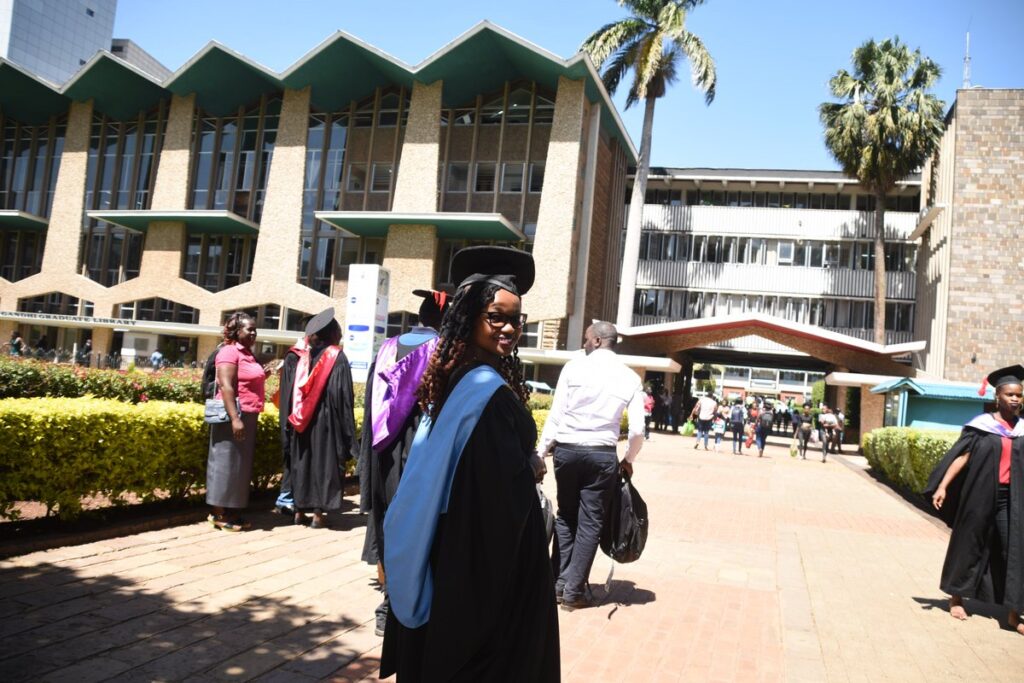
Life at the University of Nairobi is a blend of academic pursuits and vibrant extracurricular activities. The campus is a melting pot of cultures, bringing together students from all over Kenya and beyond. There are numerous student organizations, clubs, and societies that cater to a wide range of interests, from sports and arts to social causes and entrepreneurship.
The university’s sports teams, known as the Mean Machine (rugby) and the Terror (basketball), have made a mark in various national and regional competitions. The annual Nairobi Innovation Week is a highlight, showcasing the innovative projects and entrepreneurial spirit of the students and faculty.
The University of Nairobi is deeply rooted in the community and is committed to social responsibility. Through various outreach programs and partnerships, the university works to address societal challenges and improve the quality of life for communities. From healthcare initiatives to environmental conservation projects, UoN’s impact extends far beyond its campuses.
With a strong emphasis on international collaboration, the University of Nairobi has established partnerships with numerous universities and research institutions worldwide. This global network enhances the academic experience for students and provides opportunities for collaborative research and cultural exchange.
Like any institution, the University of Nairobi faces its share of challenges, including funding constraints and the need for infrastructure development. However, the university’s leadership is committed to overcoming these hurdles and continuing its legacy of excellence.
Looking ahead, UoN aims to expand its research capabilities, enhance its digital infrastructure, and foster an environment that nurtures creativity and critical thinking. The future of the University of Nairobi is bright, with endless possibilities for growth and innovation.
The University of Nairobi stands as a testament to the power of education and its ability to transform lives. It is a place where dreams take flight, ideas flourish, and leaders are made. As we celebrate its achievements and look forward to its future, one thing is clear: the University of Nairobi will continue to be a pillar of excellence and a source of pride for Kenya and the world.
Kenyatta University
Kenyatta University (KU) was established in 1985, evolving from the Kenyatta College that was founded in 1965. Named after Kenya’s first President, Jomo Kenyatta, the university has grown exponentially over the years, becoming a cornerstone of higher education in the country. With a commitment to excellence and innovation, KU has carved out a reputation as a leading institution of learning and research.
KU offers a wide array of undergraduate, postgraduate, and doctoral programs across various disciplines. From the School of Humanities and Social Sciences to the School of Engineering and Technology, the university provides comprehensive education that equips students with the knowledge and skills needed to excel in their respective fields. The university’s emphasis on research and development is evident through its numerous research centers and institutes that address critical issues such as health, technology, and sustainable development.
Campus life at Kenyatta University is a blend of rigorous academics and vibrant extracurricular activities. The university’s main campus in Nairobi is a bustling hub of activity, bringing together students from diverse backgrounds. With over 70,000 students, KU is one of the largest universities in Kenya, fostering a community that is both diverse and inclusive.
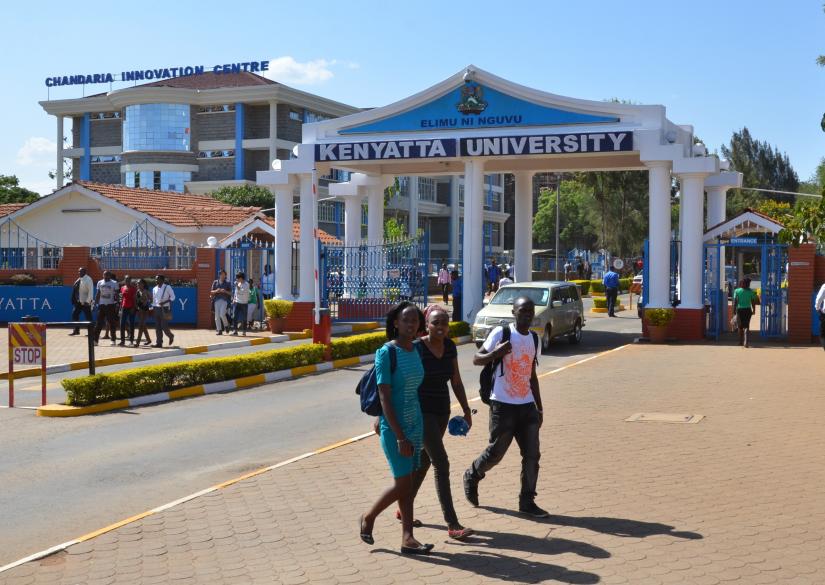
Students at KU have access to a wide range of clubs, societies, and sports teams, ensuring that there is something for everyone. Whether you are interested in joining the drama club, participating in community service, or competing in athletics, there is no shortage of opportunities to get involved and make the most of your university experience.
Kenyatta University is also home to state-of-the-art facilities, including modern lecture halls, well-equipped laboratories, and a comprehensive library that supports both learning and research. The university’s Innovation and Incubation Centre provides a platform for students and faculty to develop and nurture innovative ideas, turning them into viable business ventures.
KU is deeply committed to community engagement and social responsibility. Through various outreach programs and partnerships, the university works to address societal challenges and contribute to the well-being of communities. Initiatives such as the KU Community Outreach and Extension Program are testament to the university’s dedication to making a positive impact beyond its campuses.
International collaboration is a key aspect of Kenyatta University’s mission. The university has established partnerships with numerous institutions around the world, facilitating academic exchange, joint research, and cultural exchange programs. These partnerships enhance the academic experience for students and provide a global perspective that is essential in today’s interconnected world.
Despite its many achievements, Kenyatta University faces its own set of challenges, including the need for continuous infrastructure development and securing adequate funding. However, the university’s leadership remains steadfast in its commitment to overcoming these obstacles and ensuring that KU continues to thrive as a premier institution of higher learning.
Looking ahead, Kenyatta University aims to expand its research capabilities, integrate cutting-edge technology into its curriculum, and foster an environment that encourages creativity and critical thinking. The future of KU is filled with promise, and its journey of excellence and transformation is set to continue.
Kenyatta University stands as a beacon of education, innovation, and social responsibility. It is a place where dreams are nurtured, ideas are born, and leaders are made. As we celebrate its milestones and look forward to its future, one thing is certain: Kenyatta University will continue to be a source of pride and a pillar of progress for Kenya and the world.
Strathmore University
Strathmore University was established in 1961 as Strathmore College, a pioneering initiative aimed at providing science and arts education. It gained university status in 2002 and has since become a leading institution in Kenya, known for its high academic standards, ethical foundation, and innovative approach to education.
Strathmore University offers a wide range of undergraduate, postgraduate, and professional programs across various fields, including business, information technology, law, hospitality, and more. The university’s commitment to quality education is evident through its rigorous academic programs and the emphasis on producing well-rounded graduates equipped with both knowledge and practical skills.
One of the standout features of Strathmore University is its focus on research and innovation. The university houses several research centers and institutes that tackle pressing issues such as renewable energy, financial inclusion, and sustainable development. The Strathmore Energy Research Centre (SERC) and the iLabAfrica Research Centre are just two examples of how the university is leading the way in technological advancements and sustainable solutions.
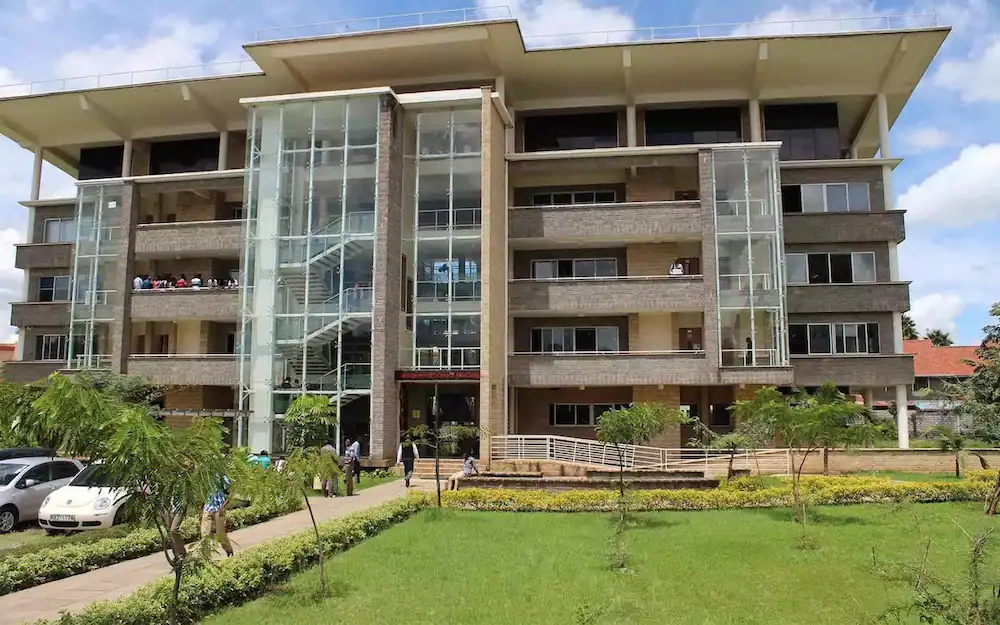
Campus life at Strathmore University is dynamic and engaging. The university’s Nairobi campus provides a conducive environment for learning and personal growth, with state-of-the-art facilities, including modern lecture halls, advanced IT labs, a well-stocked library, and recreational spaces. The campus is designed to foster a sense of community and collaboration among students and faculty.
Students at Strathmore have access to a plethora of extracurricular activities and organizations. From the Strathmore University Choir, which has gained national acclaim, to various sports teams and cultural clubs, there is something for everyone. The university’s emphasis on holistic education means that students are encouraged to engage in activities that develop their talents, leadership skills, and social responsibility.
Strathmore University is deeply committed to ethical values and social responsibility. The university’s ethos is rooted in the principles of integrity, service to society, and the pursuit of excellence. This commitment is reflected in various community outreach programs and initiatives aimed at making a positive impact on society. The Strathmore Community Service Centre (CSC) coordinates numerous projects that address education, health, and environmental sustainability.
Global partnerships and international collaboration are integral to Strathmore University’s mission. The university has established strong ties with institutions worldwide, facilitating student and faculty exchange programs, joint research projects, and global internships. These collaborations provide students with a global perspective and opportunities to gain international experience.
Despite its many successes, Strathmore University continues to strive for greater heights. Challenges such as the need for expanding infrastructure and adapting to rapidly changing educational demands are met with resilience and innovation. The university’s leadership is focused on sustaining its growth, enhancing the quality of education, and maintaining its reputation as a leading institution.
Looking forward, Strathmore University aims to expand its research initiatives, embrace new educational technologies, and foster an environment of continuous improvement and innovation. The university’s vision is to be a global leader in education, research, and community service, contributing to the development of Kenya and the world.
Strathmore University stands as a testament to the power of quality education, ethical leadership, and innovation. It is a place where academic excellence meets social responsibility, and where students are prepared to become leaders and change-makers in their communities and beyond. As we celebrate its achievements and look forward to its future, one thing is clear: Strathmore University will continue to be a pillar of excellence and a source of pride for Kenya and the world.
Mount Kenya University
Mount Kenya University (MKU) was established in 1996 as Thika Institute of Technology, evolving into a full-fledged university in 2008. Since then, MKU has grown rapidly, becoming one of Kenya’s largest private universities. Its mission is to provide world-class education and foster the development of professional skills that contribute to societal progress.
MKU offers a diverse range of undergraduate, postgraduate, and professional programs across multiple disciplines, including business, education, health sciences, law, and social sciences. The university’s commitment to academic excellence is evident through its rigorous curriculum, dedicated faculty, and state-of-the-art facilities.
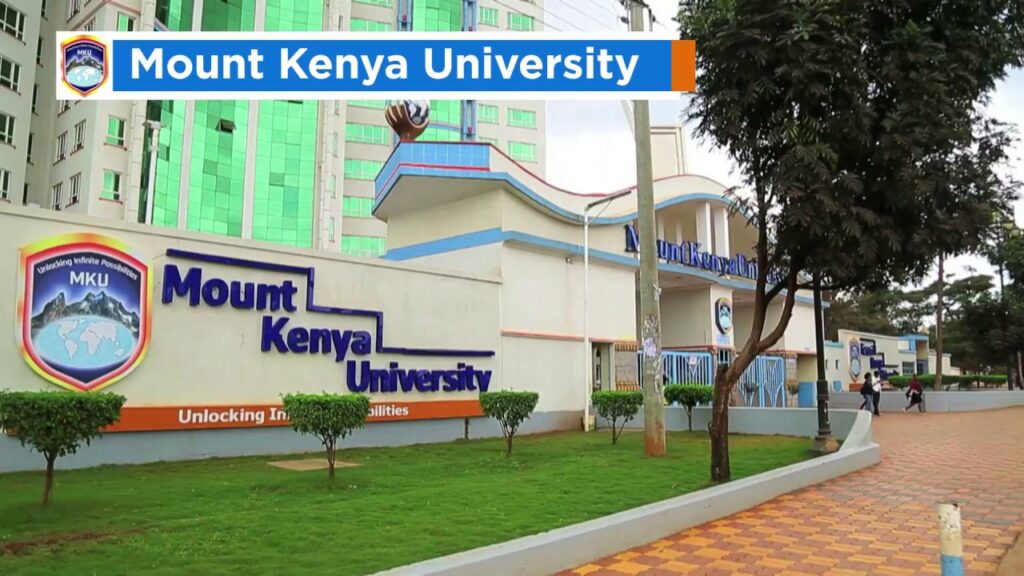
One of the key strengths of Mount Kenya University is its emphasis on research and innovation. The university is home to several research centers and institutes that address critical issues such as healthcare, environmental sustainability, and technological advancement. The Institute of Tropical Medicine and Infectious Diseases (ITROMID) is a notable example, playing a significant role in medical research and training.
Campus life at MKU is vibrant and inclusive, with a strong sense of community among students and staff. The main campus in Thika, as well as other campuses across Kenya, provides a conducive environment for learning and personal growth. Modern lecture halls, well-equipped laboratories, a comprehensive library, and various recreational facilities ensure that students have access to the resources they need to succeed.
MKU students have numerous opportunities to engage in extracurricular activities. The university supports a wide range of clubs, societies, and sports teams that cater to diverse interests. Whether it’s joining the debate club, participating in community service, or competing in sports tournaments, students are encouraged to develop their talents and leadership skills.
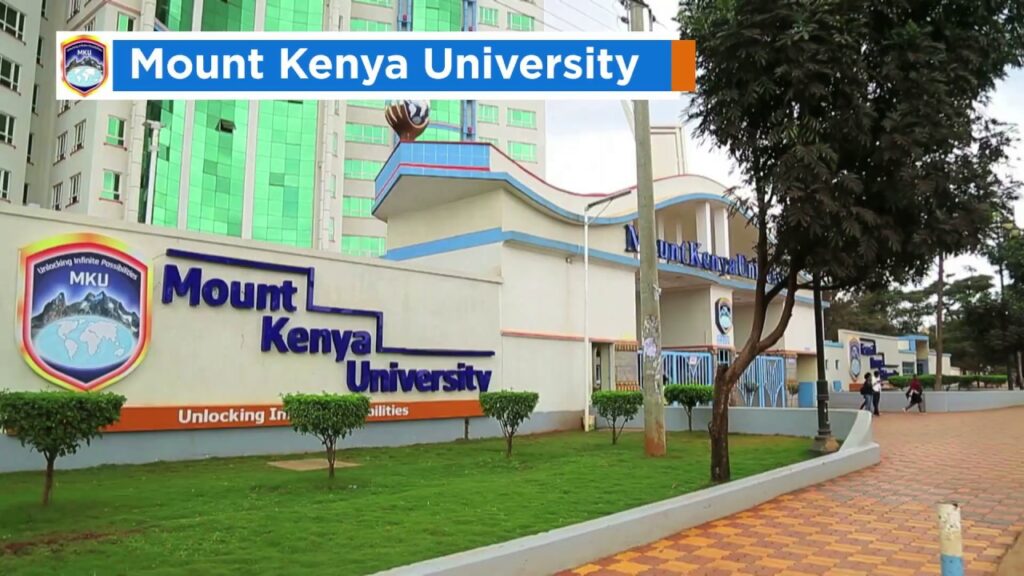
Mount Kenya University is deeply committed to community engagement and social responsibility. The university’s ethos is rooted in the belief that education should contribute to the betterment of society. Through various outreach programs and partnerships, MKU works to address societal challenges and improve the quality of life for communities. Initiatives such as the MKU Foundation focus on education, healthcare, and environmental conservation.
Global partnerships and international collaboration are integral to MKU’s strategy for growth and development. The university has established strong links with institutions worldwide, facilitating academic exchanges, joint research projects, and international internships. These collaborations enhance the learning experience for students and provide opportunities for global exposure.
Despite its many achievements, Mount Kenya University faces challenges such as the need for continuous infrastructure development and adapting to the evolving demands of higher education. However, the university’s leadership remains committed to overcoming these obstacles and maintaining its trajectory of growth and excellence.
Looking to the future, Mount Kenya University aims to expand its research capabilities, integrate innovative technologies into its teaching methods, and create an environment that fosters creativity and critical thinking. The university’s vision is to be a leading center of academic excellence, research, and community service, contributing to the development of Kenya and the wider world.
Mount Kenya University stands as a beacon of knowledge, innovation, and social responsibility. It is a place where students are equipped with the skills and values needed to make a positive impact on their communities and the world at large. As we celebrate its achievements and anticipate its future, one thing is clear: Mount Kenya University will continue to be a pillar of excellence and a source of pride for Kenya and beyond.
Jomo Kenyatta University of Agriculture and Technology
JKUAT was established in 1981 as a middle-level college and later upgraded to a full-fledged university in 1994. Named after Kenya’s first President, Jomo Kenyatta, the university has grown to become a premier institution recognized for its commitment to excellence in teaching, research, and innovation, particularly in the fields of agriculture and technology.
JKUAT offers a wide array of undergraduate, postgraduate, and doctoral programs across various disciplines, including agriculture, engineering, health sciences, information technology, and business. The university’s dedication to providing quality education is evident in its comprehensive curriculum, highly qualified faculty, and modern teaching facilities.
A cornerstone of JKUAT’s mission is its focus on research and innovation. The university is home to several research centers and institutes that address critical issues such as food security, renewable energy, and technological advancements. The JKUAT Industrial Park, for example, is a hub for innovation and entrepreneurship, providing a platform for students and researchers to develop and commercialize their ideas.
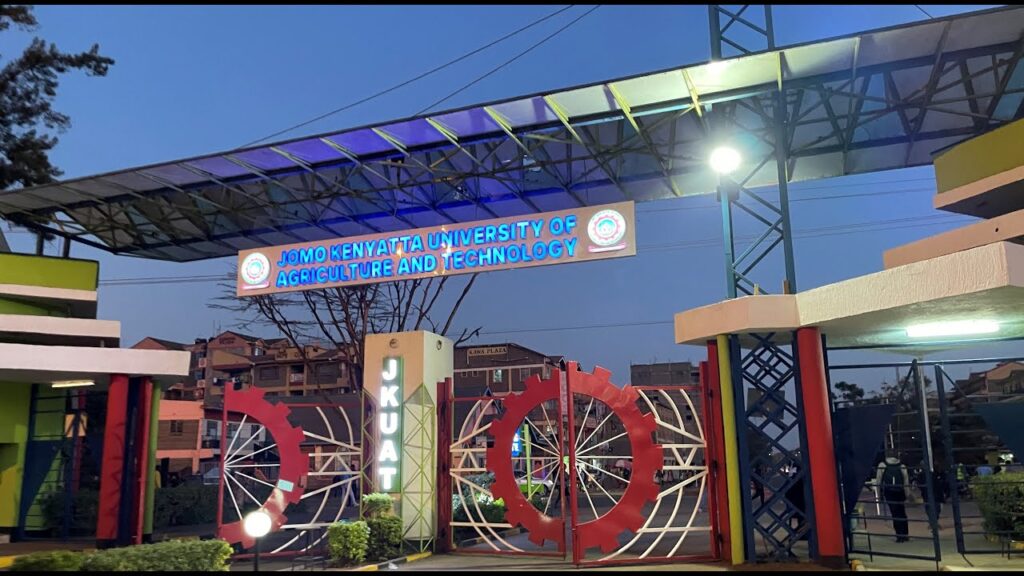
Campus life at JKUAT is vibrant and diverse, with a strong emphasis on both academic and personal development. The university’s main campus in Juja, along with other campuses across Kenya, offers a conducive environment for learning and growth. State-of-the-art laboratories, well-equipped lecture halls, an extensive library, and recreational facilities ensure that students have access to the resources they need to thrive.
Students at JKUAT are encouraged to participate in a variety of extracurricular activities. The university supports numerous clubs, societies, and sports teams that cater to a wide range of interests. From the robotics club to the agricultural society and the basketball team, there are countless opportunities for students to explore their passions, develop their talents, and build leadership skills.
JKUAT is also deeply committed to community engagement and social responsibility. The university actively participates in initiatives that address societal challenges and contribute to community development. Programs such as the JKUAT Community Outreach Program focus on improving education, healthcare, and environmental conservation in local communities.
International collaboration is a key aspect of JKUAT’s strategy for growth and development. The university has established partnerships with numerous institutions worldwide, facilitating academic exchanges, joint research projects, and international internships. These collaborations enhance the academic experience for students and provide opportunities for global exposure and networking.
Despite its many successes, JKUAT faces challenges such as the need for continuous infrastructure development and adapting to the rapidly changing demands of higher education. However, the university’s leadership is committed to overcoming these obstacles and maintaining its position as a leading institution of higher learning.
Looking to the future, JKUAT aims to expand its research initiatives, embrace new educational technologies, and foster an environment that encourages creativity and critical thinking. The university’s vision is to be a global leader in education, research, and innovation, contributing to the sustainable development of Kenya and the world.
Jomo Kenyatta University of Agriculture and Technology stands as a beacon of knowledge, innovation, and social responsibility. It is a place where students are equipped with the skills and values needed to make a positive impact on their communities and the world at large. As we celebrate its achievements and anticipate its future, one thing is clear: JKUAT will continue to be a pillar of excellence and a source of pride for Kenya and beyond.
Read More TOP UNIVERSITIES AND HIGHER EDUCATION INSTITUTIONS IN IVORY COAST




